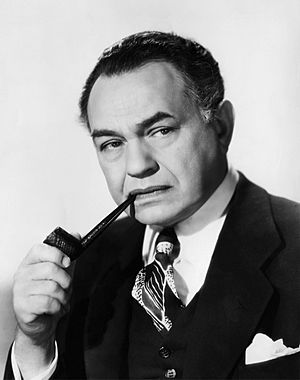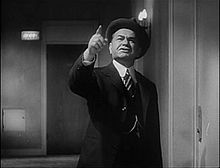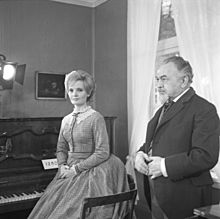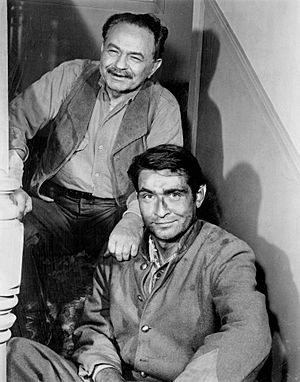Edward G. Robinson facts for kids
Quick facts for kids
Edward G. Robinson
|
|
|---|---|

Robinson in 1948
|
|
| Born |
Emanuel Goldenberg
December 12, 1893 |
| Died | January 26, 1973 (aged 79) Los Angeles, California, U.S.
|
| Resting place | Beth El Cemetery, Ridgewood, Queens |
| Occupation | Actor |
| Years active | 1913–1973 |
| Political party | Democratic |
| Spouse(s) |
Gladys Lloyd
(m. 1927; div. 1956)Jane Robinson
(m. 1958) |
| Children | Edward G. Robinson Jr. |
| Awards |
|
Edward G. Robinson (born Emanuel Goldenberg; December 12, 1893 – January 26, 1973) was a famous actor from Romania and America. He was very popular during the "Golden Age" of Hollywood movies. He acted in 30 plays on Broadway and over 100 films during his 50-year career. People often remember him for playing tough-guy gangsters in movies like Little Caesar and Key Largo. He even won an award at the Cannes Film Festival for his acting in House of Strangers.
In the 1930s and 1940s, Edward G. Robinson spoke out against fascism and Nazism. These were political ideas that were gaining power in Europe before World War II. He gave a lot of money, over $250,000, to more than 850 groups that helped with war relief. He also supported cultural, educational, and religious organizations. In the 1950s, he had to speak to the House Un-American Activities Committee during a time called the Red Scare. He was cleared of being involved with Communism after he explained he was "tricked" by some people. Because of this investigation, he was put on a "graylist" in Hollywood. This meant it was harder for him to find work at big movie studios, but he could still act in smaller films.
Robinson played many different roles. He was an insurance investigator in the crime film Double Indemnity. He played Dathan, who was against Moses, in The Ten Commandments. His very last movie role was in the science-fiction film Soylent Green. Edward G. Robinson received an Honorary Academy Award for his amazing work in movies. He got this award two months after he passed away in 1973. He is considered one of the top 25 greatest male stars of classic American cinema. Many film experts say he was one of the best actors who never got a regular Academy Award nomination.
Contents
Growing Up and Learning
Edward G. Robinson's birth name was Menashe Goldenberg. He was born into a Yiddish-speaking Jewish family in Bucharest, Romania. His parents were Sarah and Yeshaya Moyshe Goldenberg.
When he was young, one of his brothers was attacked by a group of people who were against Jewish people. Because of this, his family decided to move to the United States. Robinson arrived in New York City on February 21, 1904. He later wrote that his "life began when I was 10 years old" at Ellis Island. In America, he changed his name to Emanuel. He grew up in the Lower East Side of New York. He went to Townsend Harris High School and then the City College of New York. He first planned to become a lawyer who defends people accused of crimes. But he became interested in acting and performing. He won a scholarship to the American Academy of Dramatic Arts. After that, he changed his name to Edward G. Robinson. The "G." stood for his original family name, Goldenberg.
He was part of the United States Navy during World War I. However, he never had to go overseas to fight.
Acting Career
Early Theatre and Film Work
Edward G. Robinson started his acting career in 1913 in the Yiddish Theatre District. He first appeared on Broadway in 1915. His first movie role was in Arms and the Woman (1916).
In 1923, he was first credited as "E.G. Robinson" in the silent film The Bright Shawl.
Becoming a Star
In 1927, he played a tough gangster in a Broadway play called The Racket. This role led him to be cast in similar movie parts. His first gangster film was The Hole in the Wall (1929) with Claudette Colbert.
When movies started having sound, many actors struggled, but Robinson's career grew even more. He had only made three films before 1930. But after that, he left the stage and made 14 films between 1930 and 1932.
His big break came with his role as the gangster Caesar Enrico "Rico" Bandello in Little Caesar (1931). This movie made him a major film star.
After Little Caesar, Robinson signed a long contract with Warner Bros. He made another gangster film, Smart Money (1931), which was his only movie with James Cagney. He also played a journalist in Five Star Final (1931) and a gangster in The Hatchet Man (1932).
Robinson tried different types of movies too. He was in a true story film called Silver Dollar (1932), a comedy called The Little Giant (1933), and a romance called I Loved a Woman (1933). He also worked with famous directors like John Ford in The Whole Town's Talking (1935) and Howard Hawks in Barbary Coast (1935). He appeared with Bette Davis and Humphrey Bogart in Kid Galahad (1937).
World War II Era
When World War II began in Europe, Robinson played an FBI agent in Confessions of a Nazi Spy (1939). This was the first American movie to show Nazism as a danger to the United States.
He tried to join the military in 1942, but he was too old at 48. Instead, he became a strong voice against fascism and Nazism. He played important historical figures like scientist Paul Ehrlich in Dr. Ehrlich's Magic Bullet (1940) and news founder Paul Julius Reuter in A Dispatch from Reuter's (1940). Both films were about famous Jewish people. He also starred with Humphrey Bogart again in Brother Orchid (1940).
Robinson continued to make war films like Destroyer (1943) and Tampico (1944). He was in Billy Wilder's famous film Double Indemnity (1944) with Fred MacMurray and Barbara Stanwyck. He also worked with Joan Bennett in The Woman in the Window (1944) and Scarlet Street (1945).
He appeared in Orson Welles' thriller The Stranger (1946). He then starred as a gangster named Johnny Rocco in Key Largo (1948), directed by John Huston. This was his last film with Humphrey Bogart.
Later Career and Challenges
After being investigated during the Red Scare, it became harder for Robinson to find work. He acted in several lower-budget films like Vice Squad (1953) and Black Tuesday (1954).
His career got a big boost in 1954 when director Cecil B. DeMille cast him as the character Dathan in The Ten Commandments. This movie was released in 1956. After a short break, Robinson's film career picked up again in 1958 and 1959. He also started taking more roles on television. He was the second main actor after Frank Sinatra in the film A Hole in the Head (1959).
Supporting Roles and Final Films
Robinson took on many supporting roles in the 1960s. These included films like Seven Thieves (1960), My Geisha (1962), and The Prize (1963) with Paul Newman. He also appeared in Robin and the 7 Hoods (1964) and Cheyenne Autumn (1964).
He was a main actor alongside Steve McQueen in The Cincinnati Kid (1965). McQueen had looked up to Robinson when he was growing up. Robinson was also supposed to play Dr. Zaius in Planet Of The Apes (1968). He even did a screen test with Charlton Heston. But he had to leave the project because of heart problems and the long hours needed for the ape makeup. Maurice Evans took his place.
His later movies included Mackenna's Gold (1969) with Gregory Peck and Omar Sharif. The very last scene Robinson filmed was for the science fiction movie Soylent Green (1973), where his character passes away. He died 84 days after filming that scene.
In 1969, Charlton Heston, who was president of the Screen Actors Guild, gave Robinson an award. It was for his important work in helping to create the actors' union, his service during World War II, and his great achievements in acting.
Edward G. Robinson was never nominated for a regular Academy Award. But in 1973, he received an honorary Oscar. This award recognized his "greatness as a player, a patron of the arts and a dedicated citizen." He was told about the award, but he passed away two months before the ceremony. So, his wife, Jane Robinson, accepted the award for him.
Radio Work
From 1937 to 1942, Robinson starred as Steve Wilson in the radio show Big Town. He also played the detective Sam Spade in a radio version of The Maltese Falcon. During the 1940s, he also broadcast to South America as part of a program to promote good relationships between countries.
Political Involvement
In the 1930s, Edward G. Robinson was a strong critic of fascism and Nazism. Between 1939 and 1949, he gave over $250,000 to more than 850 political and charity groups. In 1938, he hosted a meeting where people signed a "Declaration of Democratic Independence." This statement called for people to stop buying products made in Germany. After the Nazis invaded the Soviet Union, he supported Soviet war relief efforts. He believed that all countries could unite against Hitler.
When the United States officially entered World War II, he tried to join the military but was too old. Instead, the Office of War Information made him a Special Representative in London. He used his ability to speak many languages to give radio speeches to countries in Europe that were controlled by the Nazis. He also helped sell war bonds and visited factories to encourage workers.
After the war, Robinson spoke out for equal rights for all Americans, especially for Black people in the workplace. He supported efforts to end unfair treatment at work. Black leaders praised him as a great friend and supporter of democracy. He also worked to help African Americans overcome segregation and discrimination.
Even though he spoke out against fascism, he did not criticize the Soviet Union because he saw them as an ally against Hitler. However, some people thought that if you didn't also criticize Stalin, you might be a Communist supporter. Robinson found out that 11 of the groups he had helped were listed as Communist-front organizations by the FBI. Because of this, he had to testify in front of the House Un-American Activities Committee (HUAC) in 1950 and 1952. He was also threatened with being blacklisted from Hollywood.
During his testimony in 1952, Robinson named some people he believed were Communist sympathizers. He said he felt "duped and used" by some organizations. His name was cleared, but his career still suffered. He was offered fewer roles, and they were often smaller parts. In October 1952, he wrote an article called "How the Reds made a Sucker Out of Me." The head of the committee told Robinson that they believed he was "a very choice sucker," meaning he was easily tricked.
Personal Life
Edward G. Robinson was married twice. His first marriage was to actress Gladys Lloyd in 1927. They had one son, Edward G. Robinson, Jr. (also known as Manny Robinson). Gladys also had a daughter from her first marriage. They divorced in 1956. In 1958, he married Jane Bodenheimer, who was a dress designer known as Jane Arden. He also had a home in Palm Springs, California.
Unlike the tough characters he played in movies, Robinson was a kind, quiet, and educated man. He could speak seven languages. He remained a Democrat and attended the 1960 Democratic Convention. He loved collecting art and built a large private collection. However, in 1956, he had to sell his art collection to help with his financial difficulties after his divorce.
Death
Edward G. Robinson passed away from bladder cancer on January 26, 1973, at Cedars Sinai Hospital in Los Angeles. His funeral was held at Temple Israel in Los Angeles. Charlton Heston gave a speech honoring him. Over 1,500 friends attended, with another 500 outside. His body was then taken to New York and placed in a family tomb in Beth-El Cemetery in Brooklyn. Many famous people were pallbearers, including Jack L. Warner, Frank Sinatra, and George Burns.
Selected Films
- Arms and the Woman (1916)
- The Bright Shawl (1923)
- The Hole in the Wall (1929)
- Little Caesar (1931)
- Smart Money (1931)
- Five Star Final (1931)
- Tiger Shark (1932)
- The Little Giant (1933)
- The Whole Town's Talking (1935)
- Barbary Coast (1935)
- Kid Galahad (1937)
- Confessions of a Nazi Spy (1939)
- Dr. Ehrlich's Magic Bullet (1940)
- Brother Orchid (1940)
- The Sea Wolf (1941)
- Larceny, Inc. (1942)
- Double Indemnity (1944)
- The Woman in the Window (1944)
- Scarlet Street (1945)
- The Stranger (1946)
- All My Sons (1948)
- Key Largo (1948)
- House of Strangers (1949)
- Vice Squad (1953)
- Black Tuesday (1954)
- The Violent Men (1955)
- The Ten Commandments (1956)
- A Hole in the Head (1959)
- Seven Thieves (1960)
- The Prize (1963)
- Robin and the 7 Hoods (1964)
- The Cincinnati Kid (1965)
- Mackenna's Gold (1969)
- Song of Norway (1970)
- Soylent Green (1973)
Radio Appearances
| Year | Program | Episode/source |
|---|---|---|
| 1940 | Screen Guild Theatre | Blind Alley |
| 1946 | Suspense | The Man Who Wanted to Be Edward G. Robinson |
| 1946 | This Is Hollywood | The Stranger |
| 1950 | Screen Directors Playhouse | The Sea Wolf |
Images for kids
See also
 In Spanish: Edward G. Robinson para niños
In Spanish: Edward G. Robinson para niños
- List of posthumous Academy Award winners and nominees
 | Percy Lavon Julian |
 | Katherine Johnson |
 | George Washington Carver |
 | Annie Easley |








